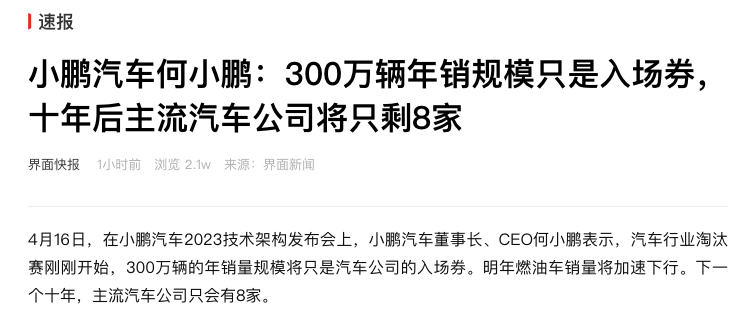In addition to Weibo, there is also WeChat
Please pay attention

WeChat public account
AutoBeta


2024-11-15 Update From: AutoBeta NAV: AutoBeta > News >
Share
AutoBeta(AutoBeta.net)08/07 Report--
Recently, according to media reports, the Canadian trade union Unifor has called for an increase in taxes on electric cars imported from China. Canada is required to impose an additional tax on Chinese-made electric vehicles in addition to the existing 100% customs rate, an additional tax of 25% on batteries and tariffs on imports of electric motors and battery materials.
It is worth mentioning that last month the Canadian government also launched a 30-day public consultation to discuss imposing tariffs on Chinese imported electric cars. At present, with the end of public consultation, Canada may introduce new tariff measures in the near future. The Canadian government has said that if left unchecked, China's unfair support for electric vehicles could lead to a sharp increase in Canadian imports, which has a negative impact on planned investment in electric cars and car transformation in Canada.

In June this year, the European Union suddenly announced an increase in tariffs on Chinese car companies. No solution can be reached with China and temporary tariffs will be imposed on electric vehicles from China on July 4, according to an official document. According to the documents, tariffs of 17.4%, 20.0% and 38.1% will be imposed on BYD, Geely Automobile and SAIC, respectively, and 21% will be imposed on Chinese automakers that participated in the survey but were not sampled. Chinese electric vehicle manufacturers that do not cooperate with the investigation will impose a tariff of 38.1%.

At that time, in response to the news released by the European Union, SAIC said: "SAIC will continue to maintain communication and cooperation with global partners in the future. I will closely monitor the development of the situation and take all necessary legal and commercial measures to effectively protect their legitimate rights and interests and the interests of global customers." Geely responded that the decision was wrong and that imposing tariffs would harm Europe's own interests and hinder the development of China-EU economy and trade.
On July 4, the European Commission announced that it would impose a temporary countervailing duty on electric vehicles imported from China from July 5, up to a maximum of four months. In the meantime, EU member states will vote on the final countervailing measures, and if passed, the EU will formally impose a five-year countervailing duty on Chinese electric vehicles. On July 15th, the European Union voted on a plan to impose temporary tariffs on Chinese-made electric cars. According to the US and British media, the 27 countries of the European Union have held the first round of secret voting. The result of the vote was 12 in favor, 4 against and 11 abstaining. If EU member states continue to maintain this willingness to vote, it will also mean that the EU tariff increase decision will come into effect in November for a period of five years.
Prior to this, the proposed tariff on Chinese electric vehicles by the European Union has also triggered opposition from people inside and outside the industry, and even the CEO of many car companies have come out to voice. For example, German Transport Minister Vicin once pointed out that the imposition of tariffs by the EU is a "destructive practice" and that solutions should be sought through dialogue to promote competition rather than create obstacles. "the relevant practices of the European Commission will not work at all, not only will not enhance the competitiveness of European automakers, but may harm those companies that are actively doing business around the world," said Chipze, chief executive of BMW Group. A Volkswagen spokesman has also said: the timing of the EU's decision is harmful to the current weak demand for pure electric vehicles (BEV) in Germany and Europe, and the negative impact outweighs any benefits to Europe, especially the German car industry.
The German Association of Automobile Manufacturers also issued a statement on the EU's decision, calling on the European Commission to abandon the temporary countervailing duties on Chinese electric vehicles and solve the problem through dialogue. work with China to ensure open markets, ensure supply chain security and achieve environmental goals. The association believes that in the medium to long term, Chinese electric cars will not "pour" into the European market. The temporary countervailing duties imposed by the EU on electric vehicles imported from China are not in line with the interests of the European Union, which will not only have a negative impact on European consumers and enterprises, but also hinder the development of the EU's local electric vehicle market and is not conducive to achieving climate goals.
This time, Canadian trade unions have called for an increase in taxes on China's imported electric cars, with industry insiders pointing out that Canada's own electric car market is underdeveloped because of cold temperatures in the region. The union's actions this time are more about sending a political signal.
Welcome to subscribe to the WeChat public account "Automotive Industry Focus" to get the first-hand insider information on the automotive industry and talk about things in the automotive circle. Welcome to break the news! WeChat ID autoWechat
Views: 0
*The comments in the above article only represent the author's personal views and do not represent the views and positions of this website. If you have more insights, please feel free to contribute and share.











© 2024 AutoBeta.Net Tiger Media Company. All rights reserved.